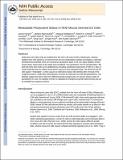Metastable Pluripotent States in NOD Mouse Derived ES Cells
Author(s)
Hanna, Jacob; Markoulaki, Styliani; Mitalipova, Maisam; Cassady, John P.; Staerk, Judith; Carey, Bryce W.; Lengner, Christopher J.; Foreman, Ruth K.; Love, Jennifer; Gao, Qing; Kim, Jongpil; Jaenisch, Rudolf; Cheng, Albert Wu; ... Show more Show less
DownloadJaenisch_Metastable pluripotent.pdf (2.436Mb)
OPEN_ACCESS_POLICY
Open Access Policy
Creative Commons Attribution-Noncommercial-Share Alike
Terms of use
Metadata
Show full item recordAbstract
Embryonic stem (ES) cells are isolated from the inner cell mass (ICM) of blastocysts, whereas
epiblast stem cells (EpiSCs) are derived from the post-implantation epiblast and display a restricted developmental potential. Here we characterize pluripotent states in the non-obese diabetic (NOD) mouse strain, which prior to this study was considered “non-permissive” for ES cell derivation. We find that NOD stem cells can be stabilized by providing constitutive expression of Klf4 or c-Myc or small molecules that can replace these factors during in vitro reprogramming. The NOD ES and iPS cells appear “metastable”, as they acquire an alternative EpiSC-like identity after removal of the exogenous factors, while their reintroduction converts the cells back to ICM-like pluripotency. Our findings suggest that stem cells from different genetic backgrounds can assume distinct states of pluripotency in vitro, the stability of which is regulated by endogenous genetic determinants and can be modified by exogenous factors.
Date issued
2009-05Department
Massachusetts Institute of Technology. Computational and Systems Biology Program; Massachusetts Institute of Technology. Department of BiologyJournal
Cell Stem Cell
Publisher
Elsevier
Citation
Hanna, Jacob et al. “Metastable Pluripotent States in NOD-Mouse-Derived ESCs.” Cell Stem Cell 4.6 (2009): 513–524.
Version: Author's final manuscript
ISSN
1934-5909